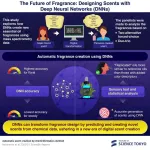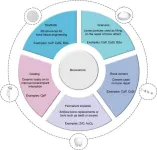(Press-News.org)
Scientific research explores the potential of DNNs in transforming fragrance design. By analyzing the sensing data of 180 essential oils, the DNN was trained using the odor descriptor data from 94 essential oils to generate fragrance profiles, validated through sensory evaluations to align with human olfactory perceptions. The study underscores the technological ability to streamline fragrance creation, reduce costs, and foster innovation, opening up exciting possibilities for personalized and scalable scent development.
Deep Neural Networks (DNNs) have become an essential driver of innovation across various industries, from healthcare to manufacturing. By analyzing large datasets, identifying patterns, and making precise predictions, DNNs are transforming the way we approach complex tasks. One such area where DNNs are making a remarkable impact is in the digitalization of smell, a field traditionally dominated by human expertise and sensory evaluations. However, a recent study aims to revolutionize this practice by exploring how DNNs can assist in fragrance design.
Moreover, an odor reproduction technique has been developed, enabling a wide variety of scents to be generated by varying the mixing ratio of a small set of odor components. These odor components are prepared by blending essential oils used in the analysis.
A research team led by Professor Takamichi Nakamoto from the Laboratory for Future Interdisciplinary Research of Science and Technology (FIRST), Institute of Integrated Research (IIR), Institute of Science Tokyo, Japan, published their research in Scientific Reports on December 28. This study was driven by the growing need for more efficient and innovative methods of fragrance creation. The study aimed to quickly make the intended scent without trial and error, leveraging DNNs to predict odor profiles based on multidimensional sensing data.
Nakamoto explains “We hypothesized that the DNNs when integrated with chemistry and sensory science could offer new insights into fragrance development. We conducted the study by analyzing mass spectrometry data from 180 essential oils, providing a comprehensive understanding of their odor components. These data were then used to train a DNN designed to predict odor descriptors from the odor-component composition. The DNN employed multiple layers optimized to capture the intricate relationships between its compositions and the resulting scents.” To improve the model’s accuracy and generalization, the team augmented the data with random mixtures of essential oil spectra and introduced noise, ensuring the model could adapt to real-world complexities. Once the DNN model generated the odor-component compositions, human evaluators assessed the DNN- generated scents alongside reference oils.
The DNN achieved the highest accuracy in predicting the odor descriptor “floral” and lower accuracy for the descriptor “woody”. Sensory testing further confirmed the effectiveness of the model, as human panelists found that the DNN-generated oils using odor components were more similar to the reference oils than those with added odor descriptors. These findings highlight the system capability to accurately replicate existing fragrance profiles and, in some cases, generate entirely new combinations.
The study demonstrates numerous benefits, like DNN can significantly reduce the time and costs involved in fragrance development by streamlining both chemical analysis and sensory evaluations. Additionally, DNN makes fragrance creation scalable, allowing it to adapt to diverse market preferences and consumer demands. Most notably, the use of DNN opens up innovative possibilities by enabling the generation of new and unique scent profiles that might not have been discovered through traditional methods.
Looking to the future, the implications of this study are profound. “As DNN models continue to evolve, they could enable the creation of personalized fragrances tailored to individual preferences. Additionally, this approach could be extended to other sensory domains, such as taste, where similar methods could be used to craft personalized flavor profiles,” shares Nakamoto.
By combining DNNs, chemical analysis, and sensory testing, the study emphasizes the potential to replicate and innovate within the fragrance industry. With its ability to enhance efficiency and creativity, a revolution in fragrance design is expected, ushering in a new era of innovation.
About Institute of Science Tokyo (Science Tokyo)
Institute of Science Tokyo (Science Tokyo) was established on October 1, 2024, following the merger between Tokyo Medical and Dental University (TMDU) and Tokyo Institute of Technology (Tokyo Tech), with the mission of “Advancing science and human wellbeing to create value for and with society.”
END
A recent review is transforming the landscape of craniomaxillofacial bone regeneration with the introduction of personalized bioceramic grafts. This pioneering research explores the fabrication and clinical potential of synthetic grafts created through additive manufacturing (AM), addressing key limitations of traditional autogenous grafts. By focusing on 3D-printed bioceramics tailored to meet individual patient needs, the study marks a significant advancement in both precision medicine and patient-specific care, offering new hope for those requiring bone reconstruction.
Craniofacial bone defects, resulting from trauma, congenital conditions, or surgical ...
Monitoring the changes caused in the brain at the molecular level by cancer and other neurological pathologies in a non-invasive way is one of the great challenges of biomedical research. A new technique, still in the experimental stage, achieves this by introducing light into the brains of mice using a very thin probe. The innovation, which is published today in the journal Nature Methods, is ledby an international team including groups from the Spanish National Research Council (CSIC) and the Spanish National Cancer Research ...
MONTREAL, Quebec, Canada, 31 December 2024 - In a comprehensive Genomic Press Interview, renowned neuroscientist Dr. Michael Meaney reveals pivotal discoveries about the intricate relationship between genes and environment in shaping brain health. As a James McGill Professor Emeritus and former Director of the Translational Neuroscience program at ASTAR Singapore, Dr. Meaney's research has fundamentally altered our understanding of how early-life experiences influence genetic expression and brain development.
"I have always been genuinely fascinated ...
JERUSALEM, Israel, 31 December 2024 - In a comprehensive Genomic Press Interview, distinguished neuroscientist Professor Raz Yirmiya unveils transformative insights into the relationship between inflammation and depression. As head of the Laboratory for Psychoneuroimmunology at the Hebrew University of Jerusalem, Professor Yirmiya's work has fundamentally changed our understanding of depression's biological underpinnings.
"Most depressed patients do not have any overt inflammatory disease. However, we and others found that exposure to stress, which is the most significant trigger of depression in humans and animals, also ...
ATLANTA, Georgia, USA, 31 December 2024 - In a comprehensive Genomic Press Interview, Emory University MD candidate Fayzan Rab shares insights into his pioneering research on the economic and public health implications of psychedelic therapy implementation. Rab's work at the Emory Center for Psychedelics and Spirituality bridges the gap between clinical research and real-world healthcare delivery systems.
"It would be a fool's errand to say that psychedelic therapies alone would change that," says Rab, discussing mental healthcare challenges. "Treating mental illness will require changes within clinical practice but also investments into social safety ...
A Medical University of South Carolina Hollings Cancer Center researcher is exploring new ways to improve treatment options for kidney cancer patients. With funding from a Department of Defense (DOD) Academy of Kidney Cancer Investigators Early Career Scholar Award, Aguirre de Cubas, Ph.D., will investigate how the immune system can be boosted to detect and kill kidney tumors. Congress established the award in 2017 to support research with high potential impact and exceptional scientific merit. De Cubas’ approach focuses on reactivating the immune system to recognize and target cancer cells better, offering new possibilities for improving existing ...
Embargoed for release until 5:00 p.m. ET on Monday 30 December 2024
@Annalsofim
Below please find summaries of new articles that will be published in the next issue of Annals of Internal Medicine. The summaries are not intended to substitute for the full articles as a source of information. This information is under strict embargo and by taking it into possession, media representatives are committing to the terms of the embargo not only on their own behalf, ...
(Calgary) — A study from a Mount Royal University physiologist and his team demonstrates the key role of the kidneys in acclimatization to high altitude, and illustrates another way that Sherpas are better adapted to high altitude ascent.
Results from the study were recently published in in the prestigious international science journal Proceedings of the National Academy of Sciences.
The paper, “Comparing integrative ventilatory and renal acid-base acclimatization in lowlanders and Tibetan highlanders during ascent to 4,300 m”, describes findings ...
SAN ANTONIO, Dec. 30, 2024 – Patients with opioid use disorder can reduce their days of opioid use and stay in treatment longer when using a smartphone app as supportive therapy in combination with medication, a new study by The University of Texas Health Science Center at San Antonio (UT Health San Antonio) shows.
The cohort study of 600 underserved patients found that those who chose to use the app – which combines contingency management behavioral therapy and recovery support from peers – and alongside medication, reduced their days of opioid use by 35% compared with ...
Key Takeaways
A new study finds little evidence that hospital mergers and acquisitions reduce costs or improve quality of care.
More strategic quality improvement efforts are needed for patients to benefit from health care integration.
CHICAGO (December 30, 2024) — Mergers and acquisitions of U.S. hospitals and health systems rarely improve the quality of care delivered or result in lower health care costs and prices, according to a study published in the Journal of the American College of Surgeons (JACS).
The study, a systematic review of hundreds of published ...





